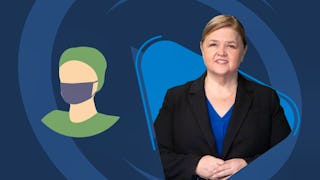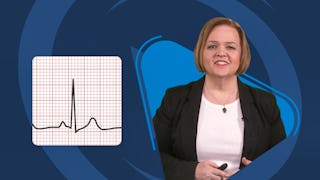This course explores the structure and function of the cardiovascular system, providing a comprehensive foundation in both anatomy and physiology. Learners will study the heart’s chambers, valves, and conduction system, as well as the major blood vessels that maintain systemic and pulmonary circulation. The course also examines key physiological principles such as cardiac output, blood flow regulation, and blood pressure control. Through detailed visuals, clinical examples, and guided review materials, students will develop a clear understanding of how the cardiovascular system sustains life and responds to physiological demands—essential knowledge for nursing, medical, and allied health education.



Cardiovascular System: Anatomy & Physiology
This course is part of Medical-Surgical Nursing: Cardiovascular & ECG Essentials Specialization


Instructors: Darren Salmi, MD, MS
Included with 
Recommended experience
What you'll learn
Identify the structural components of the heart and great vessels
Describe the pathway of blood flow through the circulatory system
Explain how the cardiac conduction system coordinates heart function
Discuss the physiological factors influencing cardiac output and blood pressure
Skills you'll gain
Details to know

Add to your LinkedIn profile
October 2025
9 assignments
See how employees at top companies are mastering in-demand skills

Build your subject-matter expertise
- Learn new concepts from industry experts
- Gain a foundational understanding of a subject or tool
- Develop job-relevant skills with hands-on projects
- Earn a shareable career certificate

There are 2 modules in this course
The cardiovascular system consists of the heart, blood, and blood vessels. As this course provides a detailed look at the structure of this system, a basic understanding of the function of the cardiovascular system would assist in comprehension. A healthy understanding of the structure of the cardiovascular system is vital for every nurse regardless of their place of work, as nearly every nursing intervention has the potential to impact this system.
What's included
6 videos6 readings3 assignments
This module provides essential knowledge of cardiac physiology critical for nursing practice. Students will explore the basic structure and function of the heart, the mechanisms that regulate cardiac rhythm, and the components of a normal cardiac cycle. The module emphasizes key cardiac parameters including stroke volume and cardiac output, the electrical conduction system of the heart, and the interpretation of heart sounds. Students will examine electrocardiogram basics and learn to recognize normal cardiac function. The module also addresses common cardiovascular disorders and their clinical management, preparing students to identify significant changes in patient status such as cardiac arrhythmias, blood pressure variations, perfusion changes, and altered urine output. Through this exploration, learners will develop the cardiovascular knowledge necessary to monitor patients effectively, recognize early warning signs of cardiac compromise, and respond appropriately during cardiac emergencies and resuscitation efforts.
What's included
18 videos5 readings6 assignments
Earn a career certificate
Add this credential to your LinkedIn profile, resume, or CV. Share it on social media and in your performance review.
Offered by
Explore more from Basic Science
Why people choose Coursera for their career





Open new doors with Coursera Plus
Unlimited access to 10,000+ world-class courses, hands-on projects, and job-ready certificate programs - all included in your subscription
Advance your career with an online degree
Earn a degree from world-class universities - 100% online
Join over 3,400 global companies that choose Coursera for Business
Upskill your employees to excel in the digital economy
Frequently asked questions
To access the course materials, assignments and to earn a Certificate, you will need to purchase the Certificate experience when you enroll in a course. You can try a Free Trial instead, or apply for Financial Aid. The course may offer 'Full Course, No Certificate' instead. This option lets you see all course materials, submit required assessments, and get a final grade. This also means that you will not be able to purchase a Certificate experience.
When you enroll in the course, you get access to all of the courses in the Specialization, and you earn a certificate when you complete the work. Your electronic Certificate will be added to your Accomplishments page - from there, you can print your Certificate or add it to your LinkedIn profile.
Yes. In select learning programs, you can apply for financial aid or a scholarship if you can’t afford the enrollment fee. If fin aid or scholarship is available for your learning program selection, you’ll find a link to apply on the description page.
More questions
Financial aid available,



